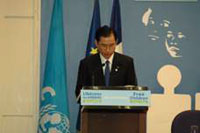Statement by Mr. Masayoshi Hamada,
Vice Minister for Foreign Affairs of Japan
At the Conference "Free Children from War"

February 5, 2007
Minister Douste-Blazy,
Ms. Venemann (Executive Director of UNICEF)
Honorable Guests,
I would like to express my sincere appreciation to Minister Douste-Blazy and Ms. Venemann for hosting today's important conference. It is an honor to be here along with Ms. Coomaraswamy, the Special Representative of the Secretary-General for Children and Armed Conflict, and the ministers and representatives of governments and NGOs from all around the world concerned with the issue of children and armed conflict.
The problem of the harmful impact of armed conflict on children has received attention for many years now. It is indeed encouraging to see from today's gathering that the concern felt by the international community is growing. At the same time, however, this means that the tragic reality is still with us.
The recruitment and use of children and any violence that is committed against them in the course of armed conflict does serious harm to both their mental and physical health. To put it simply, such acts are serious violations of the rights of children. For this reason we fully support the adoption of the Optional Protocol to the Convention on the Rights of the Child on the involvement of children in armed conflict and are pleased that 111 countries to date have become State parties, including Japan. We strongly hope that more countries will ratify this Protocol and make the utmost effort to implement it.
The international community is sending a clear message that the recruitment of children should be banned and those who engage in the practice should be punished. At the International Criminal Court, a case of the war crime of enlisting and conscripting of children under the age of 15 has been referred for trial. Not only has the Security Council established a "monitoring and reporting mechanism" to focus without any interruption on the situation of children under armed conflict; it also adopted a Resolution, which extended the scope of possible sanctions to political and military leaders recruiting of using children in violations of applicable international law in situations of armed conflict. For establishing a mechanism that contributes to crime prevention and ensuring peace, we would underline the importance of promotion of norms and ensuring respect for them. In this regard, we welcome these concrete measures the international community is taking in this field.
We think it necessary, from the viewpoint of child rights and human security, for child soldiers to let the weapons fall from their hands, for them to be given an opportunity to receive education and training, to be reintegrated into society and achieve independence. To this end, the government of Japan has supported a range of programs. For example, it extended assistance totaling about 1 million dollars for the "Youth at risk integration project" in the Republic of Congo through the Trust Fund for Human Security implemented by UNDP. This program supported the reintegration of ex-combatants into society and the rebuilding of community.
Sound development of youth is also the basis for peace and security in those communities. Peace-building being the key to achieving the MDGs, Japan has made it one of the priority issues in its ODA policy since 2003. My government accordingly provides ODA assistance for programs including collection and disposal of weapons, disarmament, demobilization and reintegration of ex-combatants, and counseling for the war affected children. In March 2006, Japan extended about 2 million dollars to the "ex-child soldiers support program in the Great Lakes Region" to be implemented by UNDP and the African Union (AU). We regard it as a valuable program, since the ownership of AU should make the results of our assistance long-lasting and stable. We hope that it will also become a model for activities in the region aimed at assisting child soldiers.
Once a child is recruited by armed forces or groups, he or she is deprived of opportunity for education or healthy life. Even when the children are released from combat assignments, because there is either no appropriate support for reintegration or no parent left, some of them find difficult to go back to school and end up becoming combatants again. The background of this vicious circle is complicated. Comprehensive efforts are needed to achieve basic targets such as the elimination of discrimination, expansion of education and poverty eradication. Japan has extended assistance to various programs in cooperation with organizations such as UNICEF. Governments, international organizations and NGOs are further expected to cooperate in an inter-related and even more active way to tackle this broad problem.
For these reasons, I would like to thank again UNICEF and its partners for drafting and presenting the Guidelines. I would also like to thank the government of France for uniting us behind the announcement of our determination to solve this problem.
I believe that, if we pool all the wisdom we have available in the different forums, we will be able to effect improvements in the situation of children under armed conflict. We should fulfill our duty to realize a world where children are free from suffering from conflicts and dream the bright and hopeful dreams they are supposed to have.
Thank you very much.
Back to Index
